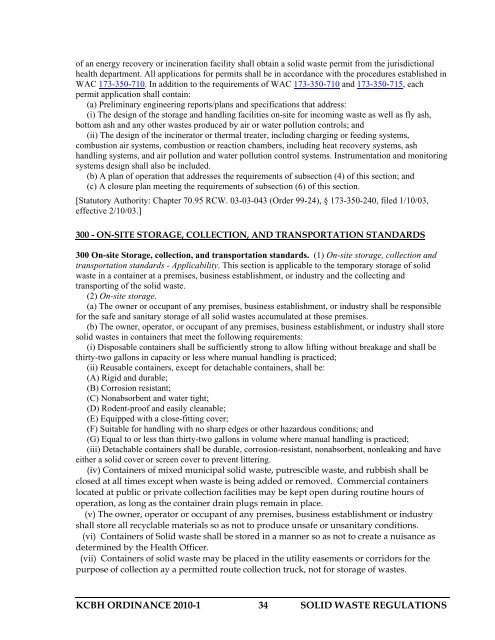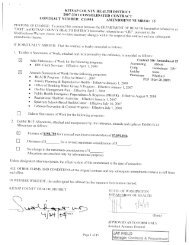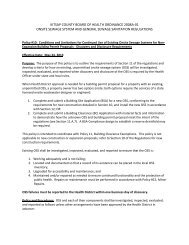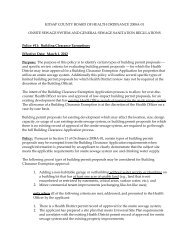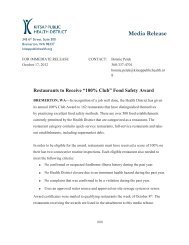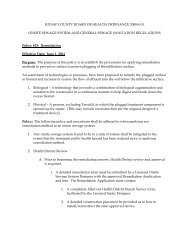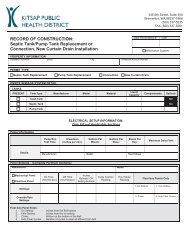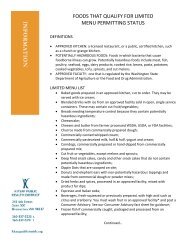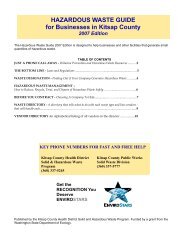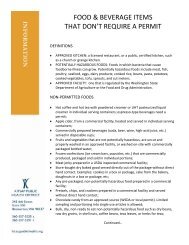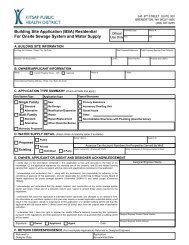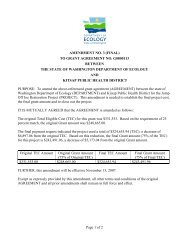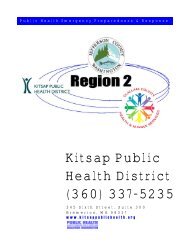SOLID WASTE REGULATIONS - Kitsap Public Health District
SOLID WASTE REGULATIONS - Kitsap Public Health District
SOLID WASTE REGULATIONS - Kitsap Public Health District
Create successful ePaper yourself
Turn your PDF publications into a flip-book with our unique Google optimized e-Paper software.
of an energy recovery or incineration facility shall obtain a solid waste permit from the jurisdictional<br />
health department. All applications for permits shall be in accordance with the procedures established in<br />
WAC 173-350-710. In addition to the requirements of WAC 173-350-710 and 173-350-715, each<br />
permit application shall contain:<br />
(a) Preliminary engineering reports/plans and specifications that address:<br />
(i) The design of the storage and handling facilities on-site for incoming waste as well as fly ash,<br />
bottom ash and any other wastes produced by air or water pollution controls; and<br />
(ii) The design of the incinerator or thermal treater, including charging or feeding systems,<br />
combustion air systems, combustion or reaction chambers, including heat recovery systems, ash<br />
handling systems, and air pollution and water pollution control systems. Instrumentation and monitoring<br />
systems design shall also be included.<br />
(b) A plan of operation that addresses the requirements of subsection (4) of this section; and<br />
(c) A closure plan meeting the requirements of subsection (6) of this section.<br />
[Statutory Authority: Chapter 70.95 RCW. 03-03-043 (Order 99-24), § 173-350-240, filed 1/10/03,<br />
effective 2/10/03.]<br />
300 - ON-SITE STORAGE, COLLECTION, AND TRANSPORTATION STANDARDS<br />
300 On-site Storage, collection, and transportation standards. (1) On-site storage, collection and<br />
transportation standards - Applicability. This section is applicable to the temporary storage of solid<br />
waste in a container at a premises, business establishment, or industry and the collecting and<br />
transporting of the solid waste.<br />
(2) On-site storage.<br />
(a) The owner or occupant of any premises, business establishment, or industry shall be responsible<br />
for the safe and sanitary storage of all solid wastes accumulated at those premises.<br />
(b) The owner, operator, or occupant of any premises, business establishment, or industry shall store<br />
solid wastes in containers that meet the following requirements:<br />
(i) Disposable containers shall be sufficiently strong to allow lifting without breakage and shall be<br />
thirty-two gallons in capacity or less where manual handling is practiced;<br />
(ii) Reusable containers, except for detachable containers, shall be:<br />
(A) Rigid and durable;<br />
(B) Corrosion resistant;<br />
(C) Nonabsorbent and water tight;<br />
(D) Rodent-proof and easily cleanable;<br />
(E) Equipped with a close-fitting cover;<br />
(F) Suitable for handling with no sharp edges or other hazardous conditions; and<br />
(G) Equal to or less than thirty-two gallons in volume where manual handling is practiced;<br />
(iii) Detachable containers shall be durable, corrosion-resistant, nonabsorbent, nonleaking and have<br />
either a solid cover or screen cover to prevent littering.<br />
(iv) Containers of mixed municipal solid waste, putrescible waste, and rubbish shall be<br />
closed at all times except when waste is being added or removed. Commercial containers<br />
located at public or private collection facilities may be kept open during routine hours of<br />
operation, as long as the container drain plugs remain in place.<br />
(v) The owner, operator or occupant of any premises, business establishment or industry<br />
shall store all recyclable materials so as not to produce unsafe or unsanitary conditions.<br />
(vi) Containers of Solid waste shall be stored in a manner so as not to create a nuisance as<br />
determined by the <strong>Health</strong> Officer.<br />
(vii) Containers of solid waste may be placed in the utility easements or corridors for the<br />
purpose of collection ay a permitted route collection truck, not for storage of wastes.<br />
KCBH ORDINANCE 2010-1 34 <strong>SOLID</strong> <strong>WASTE</strong> <strong>REGULATIONS</strong>


